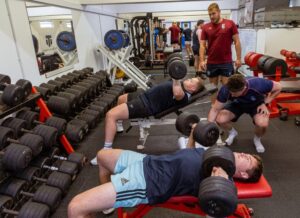
HYDRATION
The human body can survive without food for up 30-40 days; the human body can survive without water for 3 days. That is why water comes before sleep and before food in terms of our physiological safety.
Hydration is absolutely vital to health, sports and mental performance. Hydration should be a consistent habit throughout your week.
We have included hydration advice in this post about post match recovery but it really should be a consistent behaviour through every day, every week, all year. An average active adult typically need to drink 2.5 litres of fluid each day. On average about 750ml will come from foods and 250ml can come from processes within the body so 1.5-2 litres will need to come from drinking. If you are training at high intensities, training for long periods this requirement goes up. An active adult in warm environments can easily need to drink 4-9 litres of fluid a day!
Being well hydrated actually helps improve sleep, cognitive function and mood. It also serves to help regulate body temperature, improves blood flow, maintains organ function, keeps joints lubricated, prevents infection as well as aids delivering nutrients to cells and removing waste products. Good hydration is essential! Quality of your performance and also your safety as an athlete depend largely on maintaining an electrolyte balance in your body.
To monitor your hydration you can use a hydration chart. As a general rule you should be passing unrine every few (2-4) hours and it should be pale in colour.
Pre Match Hydration Strategy. Preventing dehydration is far better than dealing with it once it has set in. As detailed above, hydration should be a constant. But, if your hydration has been sub optimal through the week you need to front foot your hydration before game day. At least 24-48 hours pre game start to top up your hydration until you are in the top two levels of the hydration chart. Waking up on game day, downing 3 litres of water to ‘be hydrated’ for the game does not work!
Post Match Hydration Strategy. To monitor your hydration on game day we recommend that you weigh in before and after your match. The recovery phase of your hydration strategy should ensure that all the fluid lost during the game is replaced. For every kilo of body weight lost during the game you should make sure you drink 1 litre of fluid with salts – either sugar free isotonic or similar. Drink your fluids in 200ml boluses every 15 minutes until you drink the required volume.
The Impact of Temperature & Humidity
Temperature and humidty are in fact independent measures that work in tandelm with each other. The real threat when it comes to de-hydration depends on the level of both! Most athletes are concious of the threat of high temperature but a you can see from the chart we have included here for you that a lower ambient temperature in high humidity can be far more damaging! We’ve included two useful charts here for reference to ensure you match your fluid intake with the amount you will be likely to lose during training in different environments.
The final chart here gives a very useful breakdown of temperatures and the amount and type of work you should do in each environment. Make sure you look after yourselves if you are training or playing in high temperatures and humidities!







